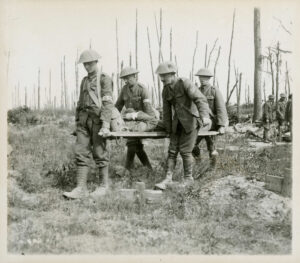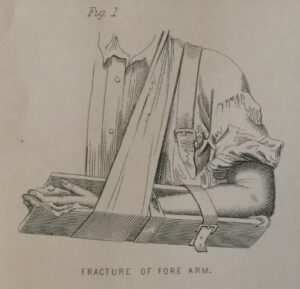4.3 min read time
Earlier in life I was trained (and served) in military medicine. Recently, I’ve been thinking through the parallels between military medicine and climate change adaptation challenge.
Triage in times of Conflict
Mass casualty events in a combat environment, involve large numbers of casualties that risk overwhelming immediately available resources. They can be chaotic and dynamic.

The Triage System, originated by Dominique Jean Larrey, chief surgeon to Napoleon’s Imperial Guard, recognised the need for a systematic approach to managing casualties, where limited resources had to be allocated efficiently amidst overwhelming casualties.
His innovation was twofold :
- The concept of prioritising treatment based on severity of injury and
- Creating an expectant category – those that are likely non-survivable given current resources.
He recognised that in a resource-limited environment it is necessary to trade off those too severely wounded in order to treat those that might have a better chance of survival. Whilst this might be seen as cold its a framework underpinned by compassion, as the outcome is survival of the greatest number, given finite resources.
Triage in times of climate challenge
So what has a nineteenth century approach to battlefield medicine got to do with climate ?
We are living in a time where the climate crisis increasingly makes its impact felt. Much as we may put energy into global mitigation, despite our best intention, not all will survive. While some regions or even nations have the resources & resilience to adapt, others—especially the poorest/most vulnerable—are likely to collapse under pressure.
As much as we might want to save everyone, an earth with reduced carrying capacity won’t support today’s population density or longevity. The limits to growth outlined this idea over 50 years ago with a set of predictions that the observable data continues to affirm.
With this in mind it may be wise to consider whether the triage concept provides a model that will help us preserve the greatest number – whether the unit is humans, cultural artefacts, food production or other resources.
How would this work in Practice ?
The principle could be extended to examine and categorise localities and regions into those categories used in Triage.
- Immediate Prioritisation : regions that have a chance of survival with investment.
- Delayed : regions that will need significant care but are not in imminent danger
- Minimal : Minor impact expected but very much functional without intervention.
- Expectant : There are regions and potentially some countries that will not survive in current form. No amount of aid, infrastructure, or global goodwill will save them.
Critiquing this Idea
There are no doubt challenges to this idea including :

- Ethical considerations of ‘surrendering’ people and regions to climate-induced destruction.
- Determining which institution is qualified to decide whether a region is viable;
- Potential for civil unrest and acceleration of disruption once an area is declared non-viable;
- Climate induced migration once an area is declared non-viable.
And yet, and yet… the alternative is that we squander finite resource and energy on temporarily delaying the impact of climate on a region only to find that extreme weather, sea level rise, drought or landslide make that region inviable a few years or decades later. Climate change will not discriminate. Climate does not consider ethics in its impact. As Tony Robbins said ‘deal with reality or reality will deal with you’.
Conclusion
It may be time now to revisit Larrey’s ideas, develop the protocols for regional, national and international climate triage to identify which areas can realistically survive and thrive in a radically changed world.
The challenge calls on us, not to shy away from decisions we would prefer not to face, but to calmly consider, use and reuse all the innovation, science and frameworks developed at any point in our history as it is these tools that have enabled us to survive and thrive to date. Now is the time to put them to new use.


An interesting blog, which certainly gives you something to think about.
Ethically, I agree, it’s a tough one, but getting tough might be the only way forward.